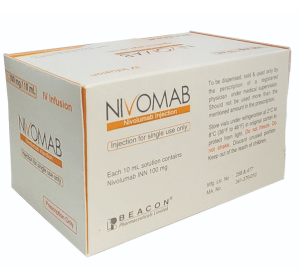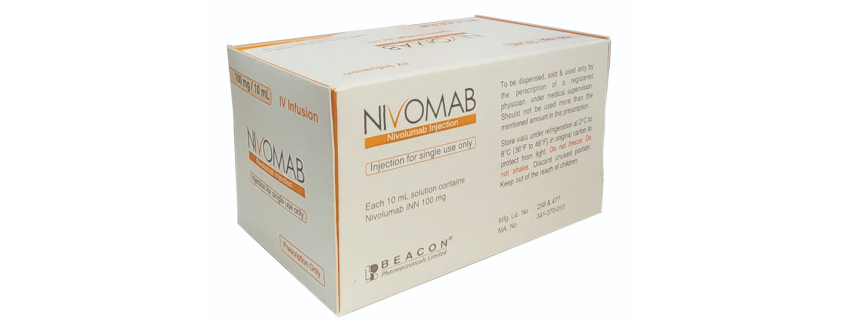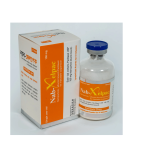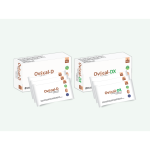Nivomab

Generic Name:Nivolumab
Indications
Nivomab is a programmed death receptor-1 (PD-1)-blocking antibody indicated for the treatment of:
Melanoma:
- patients with unresectable or metastatic melanoma, as a single agent or in combination with ipilimumab.
- patients with melanoma with lymph node involvement or metastatic disease who have undergone complete resection, in the adjuvant setting.
Non-Small Cell Lung Cancer (NSCLC):
- adult patients with metastatic non-small cell lung cancer expressing PD-L1 (≥1%) as determined by an FDA-approved test, with no EGFR or ALK genomic tumor aberrations, as first-line treatment in combination with ipilimumab.
- adult patients with metastatic or recurrent non-small cell lung cancer with no EGFR or ALK genomic tumor aberrations as first-line treatment, in combination with ipilimumab and 2 cycles of platinum doublet chemotherapy.
- patients with metastatic non-small cell lung cancer and progression on or after platinum-based chemotherapy. Patients with EGFR or ALK genomic tumor aberrations should have disease progression on FDA-approved therapy for these aberrations prior to receiving Nivomab.
Malignant Pleural Mesothelioma: adult patients with unresectable malignant pleural mesothelioma, as first-line treatment in combination with ipilimumab.
Renal Cell Carcinoma (RCC):
- patients with intermediate or poor risk advanced renal cell carcinoma, as a first-line treatment in combination with ipilimumab.
- patients with advanced renal cell carcinoma, as a first-line treatment in combination with cabozantinib.
- patients with advanced renal cell carcinoma who have received prior anti-angiogenic therapy.
Classical Hodgkin Lymphoma (cHL): adult patients with classical Hodgkin lymphoma that has relapsed or progressed after
- autologous hematopoietic stem cell transplantation (HSCT) and brentuximab vedotin, or
- 3 or more lines of systemic therapy that includes autologous HSCT.
Squamous Cell Carcinoma of the Head and Neck (SCCHN): patients with recurrent or metastatic squamous cell carcinoma of the head and neck with disease progression on or after a platinum-based therapy.
Urothelial Carcinoma: patients with locally advanced or metastatic urothelial carcinoma who a: have disease progression during or following platinum-containing chemotherapy; have disease progression within 12 months of neoadjuvant or adjuvant treatment with platinum-containing chemotherapy.
Colorectal Cancer: adult and pediatric (12 years and older) patients with microsatellite instability-high (MSI-H) or mismatch repair deficient (dMMR) metastatic colorectal cancer that has progressed following treatment with a fluoropyrimidine, oxaliplatin, and irinotecan, as a single agent or in combination with ipilimumab.
Hepatocellular Carcinoma (HCC): patients with hepatocellular carcinoma who have been previously treated with sorafenib, as a single agent or in combination with ipilimumab. a (1.10)
Esophageal Squamous Cell Carcinoma (ESCC): patients with unresectable advanced, recurrent or metastatic esophageal squamous cell carcinoma after prior fluoropyrimidine- and platinum-based chemotherapy.
Gastric Cancer, Gastroesophageal Junction Cancer, and Esophageal Adenocarcinoma:
- patients with advanced or metastatic gastric cancer, gastroesophageal junction cancer, and esophageal adenocarcinoma in combination with fluoropyrimidine- and platinum-containing chemotherapy.
- This indication is approved under accelerated approval based on overall response rate and duration of response. Continued approval for this indication may be contingent upon verification and description of clinical benefit in confirmatory trials.
- Treatment of patients with multiple myeloma with a PD-1 or PD-L1 blocking antibody in combination with a thalidomide analog plus dexamethasone is not recommended outside of controlled clinical trials.
Pharmacology
Binding of the PD-1 ligands, PD-L1 and PD-L2, to the PD-1 receptor found on T cells, inhibits T-cell proliferation and cytokine production. Upregulation of PD-1 ligands occurs in some tumors and signaling through this pathway can contribute to inhibition of active T-cell immune surveillance of tumors. Nivolumab is a human immunoglobulin G4 (IgG4) monoclonal antibody that binds to the PD-1 receptor and blocks its interaction with PD-L1 and PD-L2, releasing PD-1 pathway-mediated inhibition of the immune response, including the anti-tumor immune response. In syngeneic mouse tumor models, blocking PD-1 activity resulted in decreased tumor growth.
Combined nivolumab (anti-PD-1) and ipilimumab (anti-CTLA-4) mediated inhibition results in enhanced T-cell function that is greater than the effects of either antibody alone, and results in improved anti-tumor responses in metastatic melanoma and advanced RCC. In murine syngeneic tumor models, dual blockade of PD-1 and CTLA-4 resulted in increased anti-tumor activity.
Dosage & Administration
Administer by intravenous infusion based upon recommended infusion rate for each indication.
Unresectable or metastatic melanoma:
- 240 mg every 2 weeks or 480 mg every 4 weeks.
- 1 mg/kg followed by ipilimumab 3 mg/kg on the same day every 3 weeks for 4 doses, then 240 mg every 2 weeks or 480 mg every 4 weeks.
Adjuvant treatment of melanoma: 240 mg every 2 weeks or 480 mg every 4 weeks.
Metastatic non-small-cell lung cancer:
- 3 mg/kg every 2 weeks with ipilimumab 1 mg/kg every 6 weeks.
- 360 mg every 3 weeks with ipilimumab 1 mg/kg every 6 weeks and 2 cycles of platinum-doublet chemotherapy.
- 240 mg every 2 weeks or 480 mg every 4 weeks.
Malignant pleural mesothelioma: 360 mg every 3 weeks with ipilimumab 1 mg/kg every 6 weeks.
Advanced renal cell carcinoma:
- 3 mg/kg followed by ipilimumab 1 mg/kg on the same day every 3 weeks for 4 doses, then 240 mg every 2 weeks or 480 mg every 4 weeks.
- 240 mg every 2 weeks or 480 mg every 4 weeks administered in combination with cabozantinib 40 mg once daily without food.
- 240 mg every 2 weeks or 480 mg every 4 weeks.
Classical Hodgkin lymphoma: 240 mg every 2 weeks or 480 mg every 4 weeks.
Recurrent or metastatic squamous cell carcinoma of the head and neck: 240 mg every 2 weeks or 480 mg every 4 weeks.
Locally advanced or metastatic urothelial carcinoma: 240 mg every 2 weeks or 480 mg every 4 weeks.
Microsatellite instability-high (MSI-H) or mismatch repair deficient (dMMR) metastatic colorectal cancer:
- Adult and pediatric patients ≥40 kg: 240 mg every 2 weeks or 480 mg every 4 weeks.
- Pediatric patients <40 kg: 3 mg/kg every 2 weeks.
- Adult and pediatric patients ≥40 kg: 3 mg/kg followed by ipilimumab 1 mg/kg on the same day every 3 weeks for 4 doses, then 240 mg every 2 weeks or 480 mg every 4 weeks.
Hepatocellular carcinoma:
- 240 mg every 2 weeks or 480 mg every 4 weeks.
- 1 mg/kg followed by ipilimumab 3 mg/kg on the same day every 3 weeks for 4 doses, then 240 mg every 2 weeks or 480 mg every 4 weeks.
Esophageal squamous cell carcinoma: 240 mg every 2 weeks or 480 mg every 4 weeks.
Gastric cancer, gastroesophageal junction cancer, and esophageal adenocarcinoma (GC, GEJC, or EAC):
- 360 mg every 3 weeks with fluoropyrimidine- and platinum-containing chemotherapy every 3 weeks.
- 240 mg every 2 weeks with fluoropyrimidine- and platinum-containing chemotherapy every 2 weeks.



